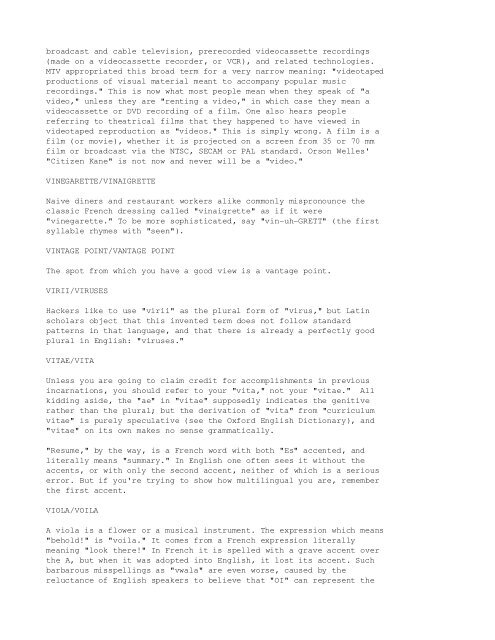Common_Errors_in_English_usage
Common_Errors_in_English_usage
Common_Errors_in_English_usage
Create successful ePaper yourself
Turn your PDF publications into a flip-book with our unique Google optimized e-Paper software.
oadcast and cable television, prerecorded videocassette record<strong>in</strong>gs<br />
(made on a videocassette recorder, or VCR), and related technologies.<br />
MTV appropriated this broad term for a very narrow mean<strong>in</strong>g: "videotaped<br />
productions of visual material meant to accompany popular music<br />
record<strong>in</strong>gs." This is now what most people mean when they speak of "a<br />
video," unless they are "rent<strong>in</strong>g a video," <strong>in</strong> which case they mean a<br />
videocassette or DVD record<strong>in</strong>g of a film. One also hears people<br />
referr<strong>in</strong>g to theatrical films that they happened to have viewed <strong>in</strong><br />
videotaped reproduction as "videos." This is simply wrong. A film is a<br />
film (or movie), whether it is projected on a screen from 35 or 70 mm<br />
film or broadcast via the NTSC, SECAM or PAL standard. Orson Welles'<br />
"Citizen Kane" is not now and never will be a "video."<br />
VINEGARETTE/VINAIGRETTE<br />
Naive d<strong>in</strong>ers and restaurant workers alike commonly mispronounce the<br />
classic French dress<strong>in</strong>g called "v<strong>in</strong>aigrette" as if it were<br />
"v<strong>in</strong>egarette." To be more sophisticated, say "v<strong>in</strong>uhGRETT" (the first<br />
syllable rhymes with "seen").<br />
VINTAGE POINT/VANTAGE POINT<br />
The spot from which you have a good view is a vantage po<strong>in</strong>t.<br />
VIRII/VIRUSES<br />
Hackers like to use "virii" as the plural form of "virus," but Lat<strong>in</strong><br />
scholars object that this <strong>in</strong>vented term does not follow standard<br />
patterns <strong>in</strong> that language, and that there is already a perfectly good<br />
plural <strong>in</strong> <strong>English</strong>: "viruses."<br />
VITAE/VITA<br />
Unless you are go<strong>in</strong>g to claim credit for accomplishments <strong>in</strong> previous<br />
<strong>in</strong>carnations, you should refer to your "vita," not your "vitae." All<br />
kidd<strong>in</strong>g aside, the "ae" <strong>in</strong> "vitae" supposedly <strong>in</strong>dicates the genitive<br />
rather than the plural; but the derivation of "vita" from "curriculum<br />
vitae" is purely speculative (see the Oxford <strong>English</strong> Dictionary), and<br />
"vitae" on its own makes no sense grammatically.<br />
"Resume," by the way, is a French word with both "Es" accented, and<br />
literally means "summary." In <strong>English</strong> one often sees it without the<br />
accents, or with only the second accent, neither of which is a serious<br />
error. But if you're try<strong>in</strong>g to show how multil<strong>in</strong>gual you are, remember<br />
the first accent.<br />
VIOLA/VOILA<br />
A viola is a flower or a musical <strong>in</strong>strument. The expression which means<br />
"behold!" is "voila." It comes from a French expression literally<br />
mean<strong>in</strong>g "look there!" In French it is spelled with a grave accent over<br />
the A, but when it was adopted <strong>in</strong>to <strong>English</strong>, it lost its accent. Such<br />
barbarous misspell<strong>in</strong>gs as "vwala" are even worse, caused by the<br />
reluctance of <strong>English</strong> speakers to believe that "OI" can represent the





